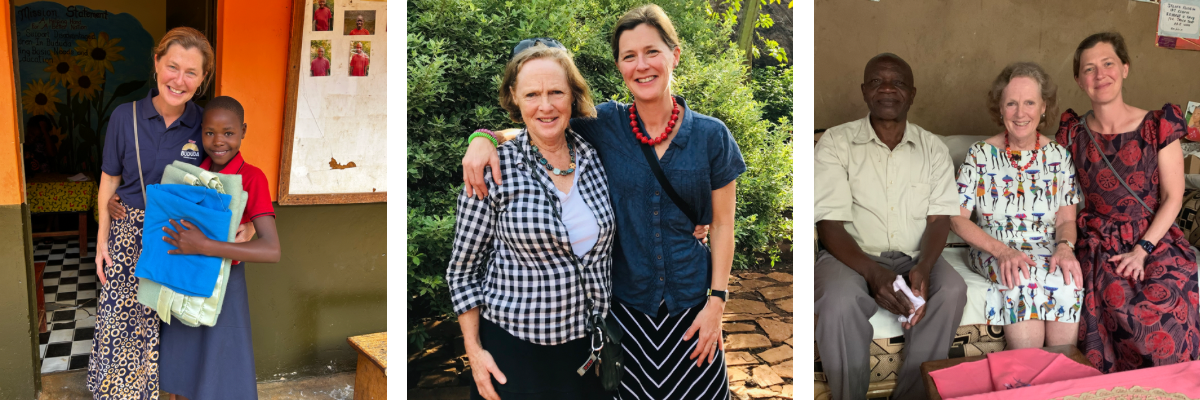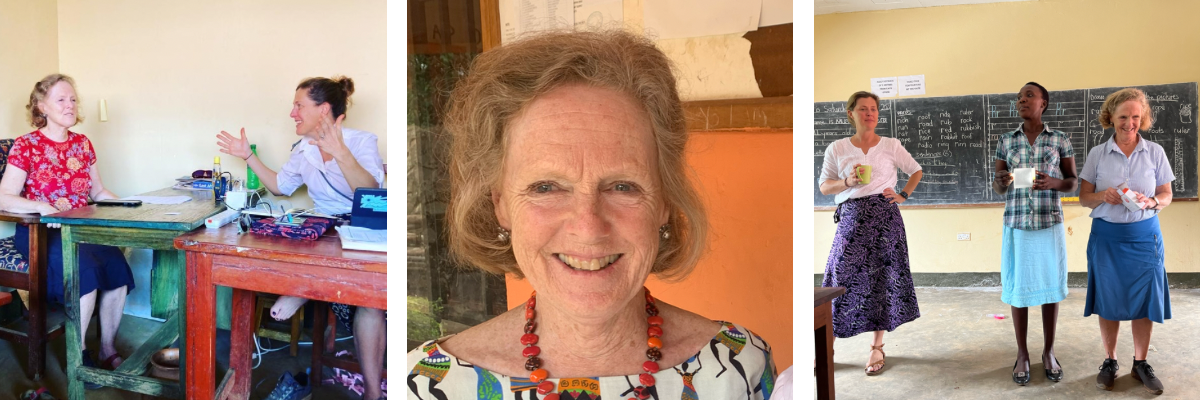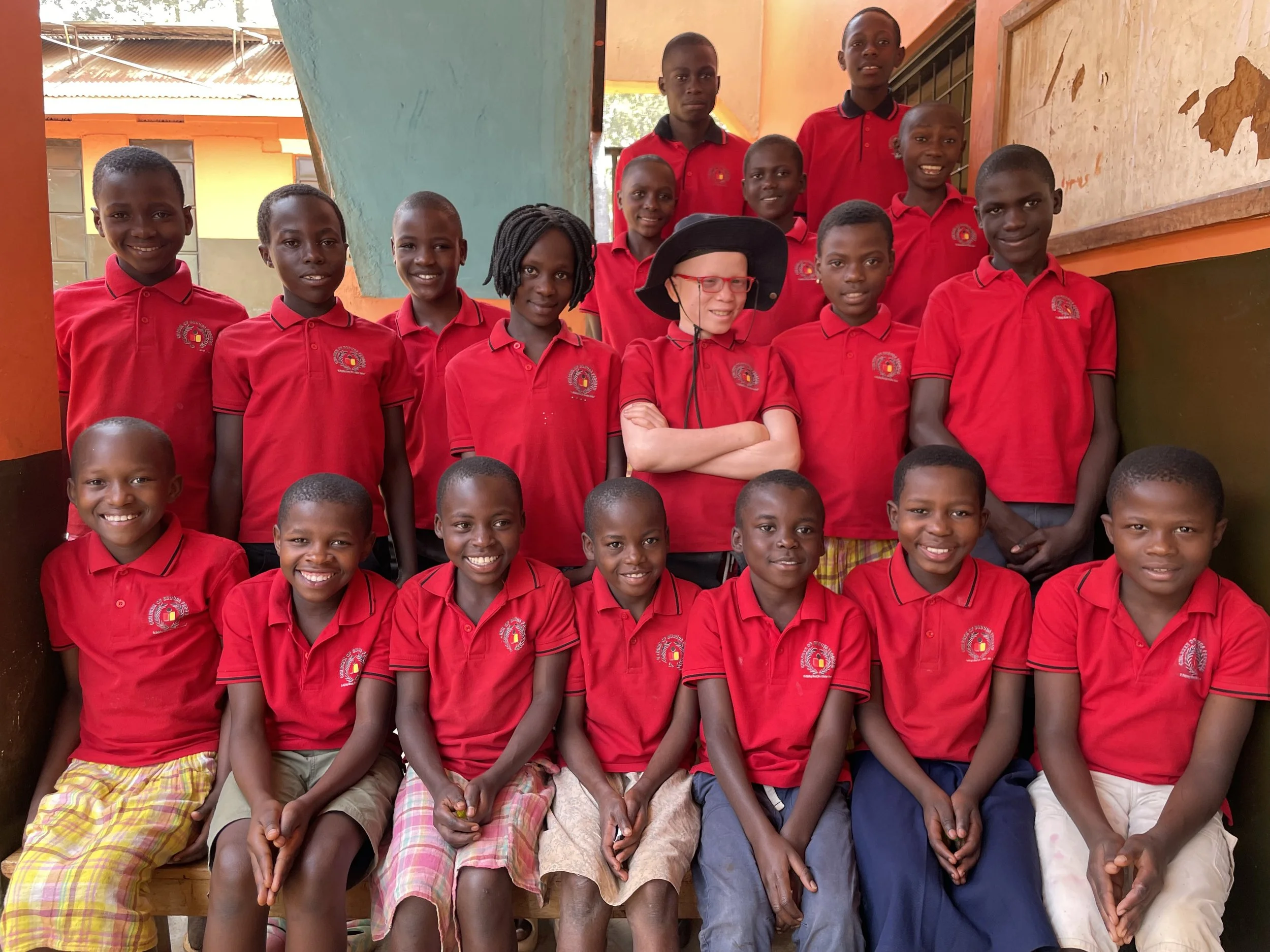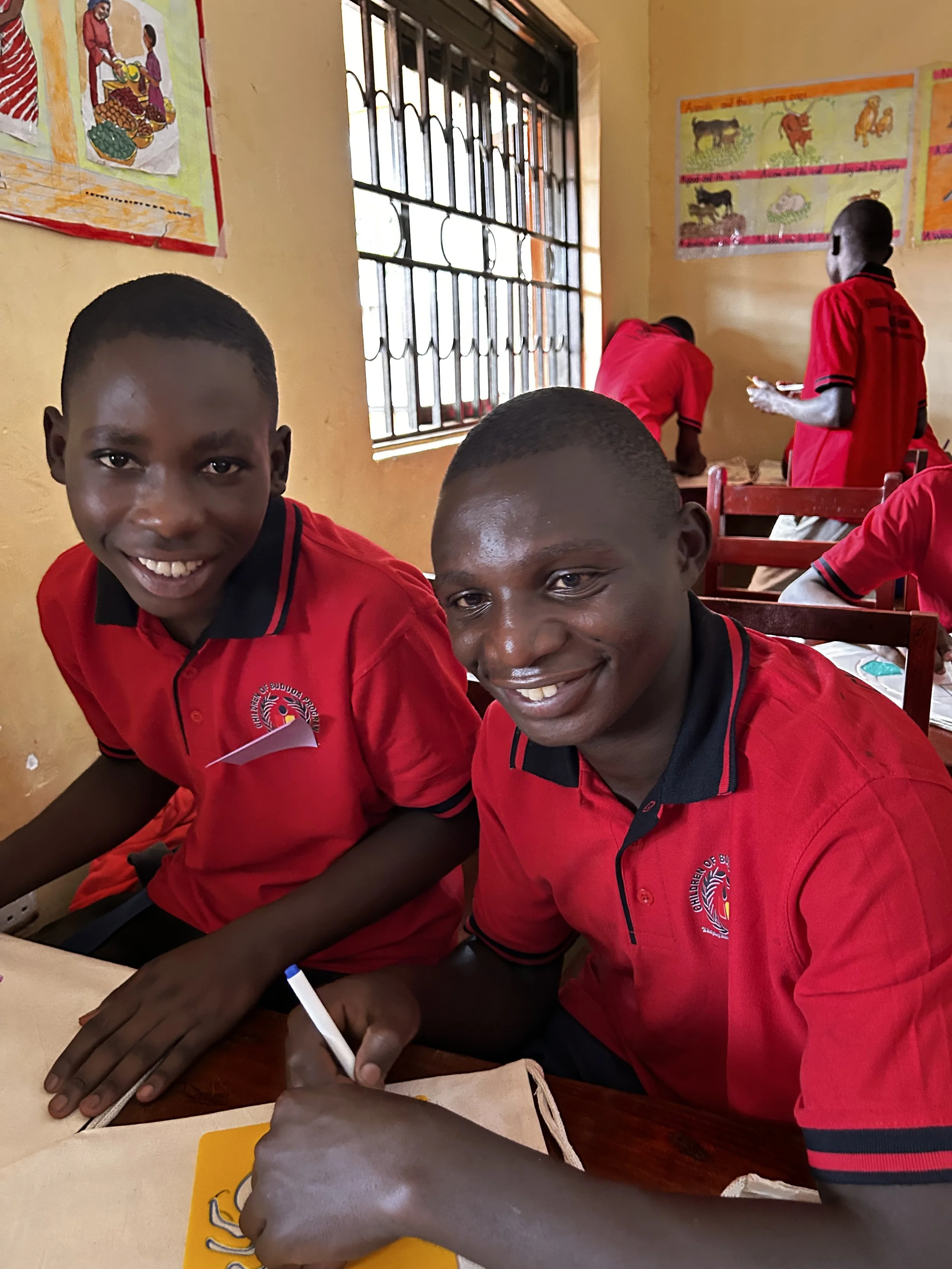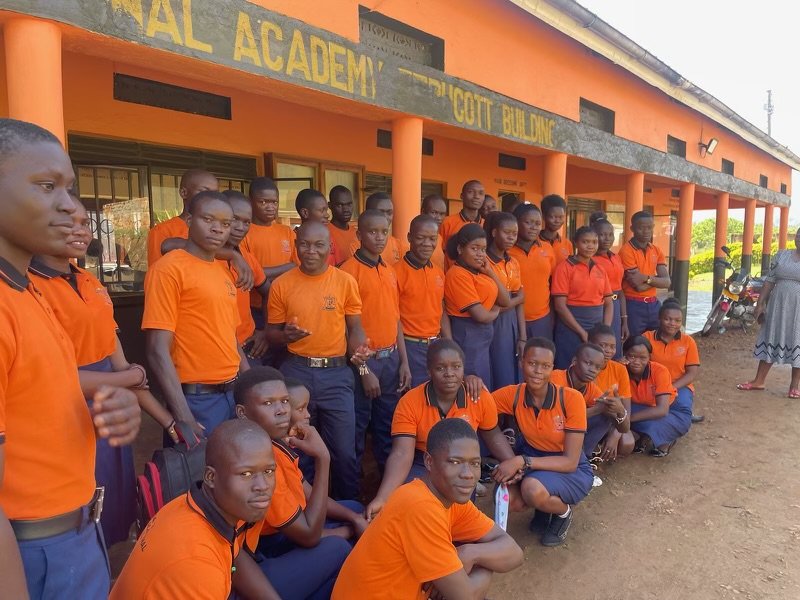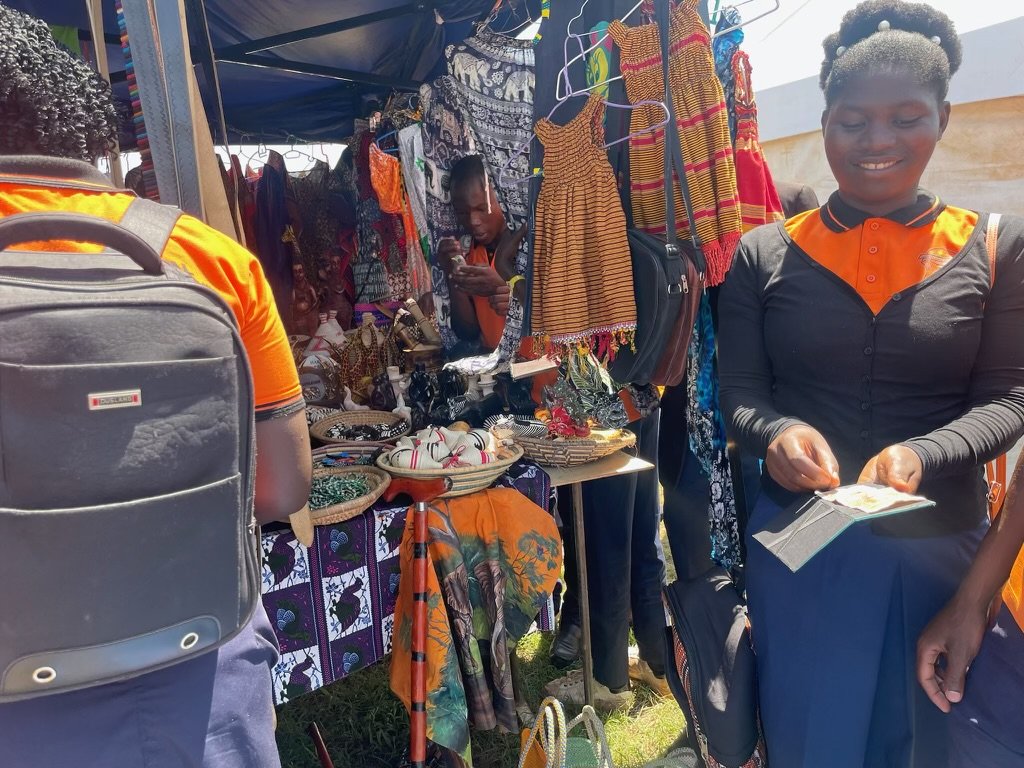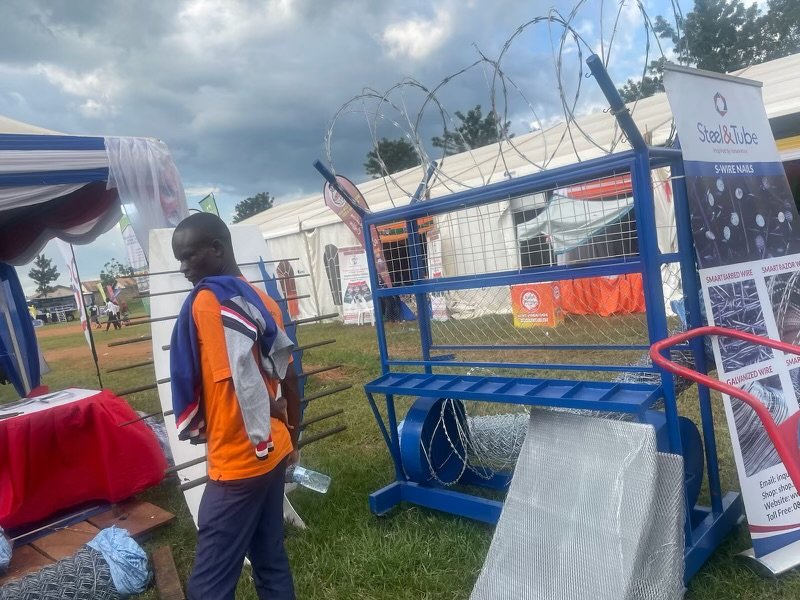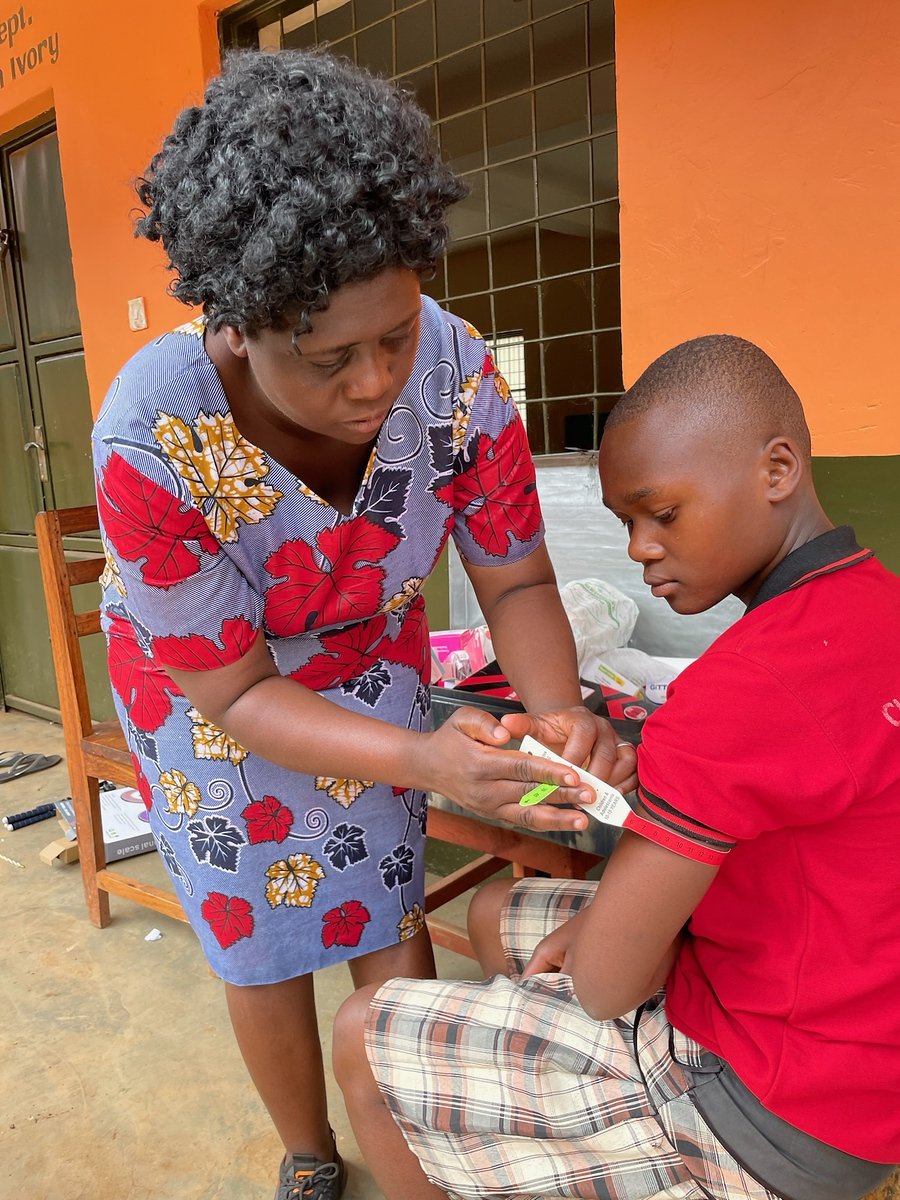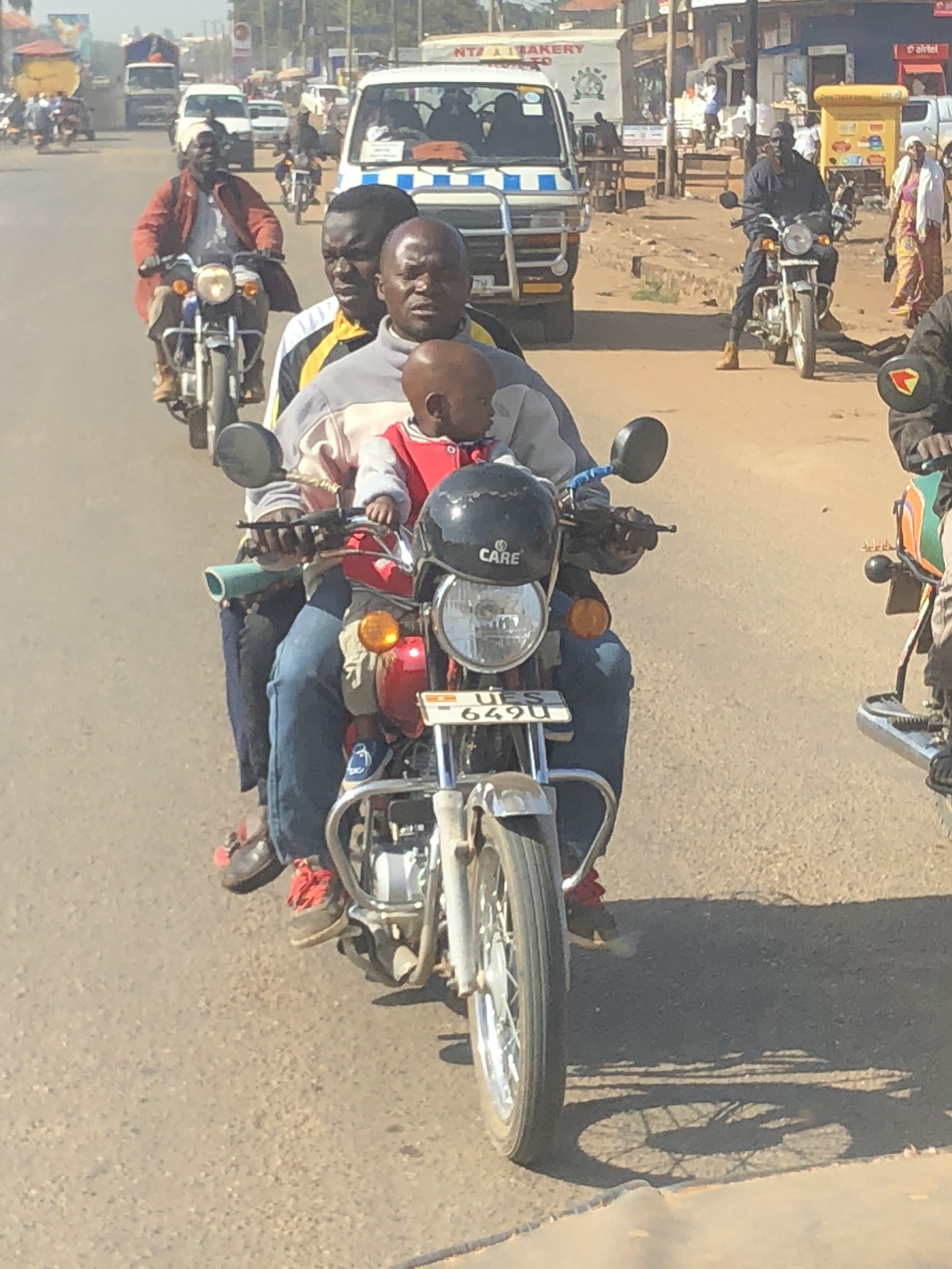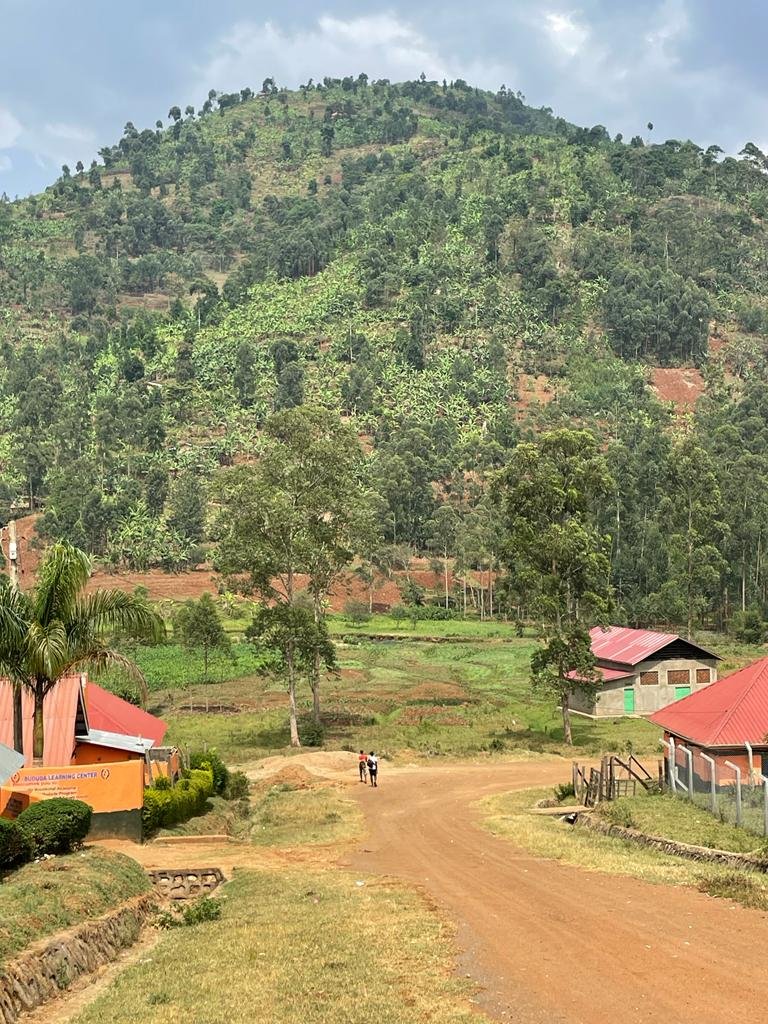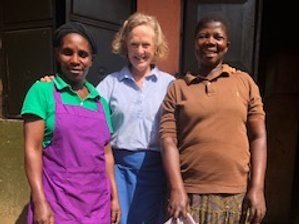Looking Ahead: A Leadership Transition at BLC
From the Board of Directors of Bududa Learning Center
Over the past two decades, Barbara Wybar's leadership and heart have been central to Bududa Learning Center. From the earliest days in Bududa, to the vibrant community that exists today, Barbara's vision has created a lasting legacy of education, dignity, and opportunity. Because of her efforts and the partnership of countless supporters like you, BLC is not only standing, but thriving.
From the Board of Directors of Bududa Learning Center
Over the past two decades, Barbara Wybar’s leadership and heart have been central to the growth and success of the Bududa Learning Center and its role supporting our community in Bududa, Uganda. She’s watched students grow, families flourish, and dreams that once felt out of reach begin to take shape.
Today, thanks to the collective efforts of Barbara and countless supporters like you who believe in the power of education, dignity, and opportunity, Bududa Learning Center is not only standing but thriving – over the years a beautiful campus has been developed in the town center (classrooms and girls’ and boys’ dormitories), the curriculum has expanded and strengthened, the school has been officially recognized by the Ugandan government, and enrollment has increased.
Like any living institution, BLC must continue to grow. And to grow well, we need to plan ahead.
That's why we’re excited to announce a leadership transition that will help lead BLC successfully into the future. While this transition has been in motion for some time, we are pleased to officially introduce Court Young as our North American Director.
Many of you already know Court. Since first getting involved in 2017, she's led more than a dozen trips to Bududa, worked closely with our Ugandan staff, and is now often the person behind the scenes helping things run smoothly. In 2022 a board-led transition committee, chaired by Barbara, formally invited Court to step into a greater leadership role.
Since then, she’s led annual trips to Uganda, conducted interviews with staff and students to strengthen our programs, and taken on increasing responsibility across operations, strategy, and finance. Court is also the point person our Ugandan staff turn to for guidance and leadership, and she handles it all with clarity, humility, and heart.
Today, Court is bringing in new donors, leading strategic growth, and working closely with our Ugandan team to ensure everything we do is rooted in the community and built to last. She, along with our Ugandan team, runs the organization's day-to-day operations. She's stewarding growth with skill and caring, guiding everything from budgets to program design to strategic conversations with remarkable insight.
This transition doesn't mean Barbara is stepping away. If you're one of the friends and supporters who’ve had the privilege of knowing her for years, you'll still be hearing from her. She will continue to support BLC's fundraising, donor engagement, and storytelling, which is the work she enjoys most. To hear more from Barbara about this leadership transition and her continuing work for BLC, see video below.
We are at a moment in time when planning for long-term sustainability is not just wise; it's necessary. Our Board, along with Barbara, are supporting Court's leadership to do just that. Already, Court has led some of our most exciting new initiatives, including the launch of our Agriculture Department and the COB Nutrition Initiative.
We couldn't be more proud of the work Barbara and Court have done, and we’re even more excited about the future and the legacy they’re building together. Please welcome Court Young as North American Director and join us in extending our deepest gratitude to Barbara Wybar, who, after more than two decades of leadership, is stepping down from her formal role but will remain involved as Founder.
As we look ahead, we invite you to help sustain Barbara’s legacy through our Legacy Builders community and ongoing programs that carry her vision forward.
With gratitude,
Bududa Learning Center, Board of Directors
_
Here is our interview with Barbara regarding this addition to the leadership team and how things are functioning now:
Nourishing Hope: How Daily Porridge and RUTF Are Transforming Nutrition at BLC
Thanks to daily porridge and RUTF, children at Bududa Learning Center are growing stronger, learning better, and living healthier lives. Our nurse and social worker report boosted immunity, improved focus in class, and greater strength to support their families at home—clear signs of the program’s powerful impact.
At Bududa Learning Center, we know that a child cannot learn on an empty stomach. That’s why the Children of Bududa’s Nutrition Intervention Program is more than a support service - it’s a lifeline. In our community, undernutrition is a persistent challenge that threatens children’s health, development, and ability to thrive in school. But through a simple, targeted intervention, daily porridge combined with Ready-to-Use Therapeutic Food (RUTF), we’re seeing incredible results and progress.
A Daily Boost: The Power of Porridge + RUTF
Each day, students enrolled in the Children of Bududa program drink a warm, nutritious cup of porridge, made from oats, powdered milk and sugar. While it may seem simple, this daily meal fills critical nutritional gaps, providing children with essential calories and nutrients they may not otherwise get at home. The porridge helps stabilize energy levels, improve concentration in the classroom, and support overall growth. We complement their porridge intake with RUTF, a high calorie, nutrient dense supplement designed to treat acute malnutrition. When taken alongside daily porridge, the results are profound.
The Results We’re Seeing
Teachers and caregivers are already reporting visible improvements. Children who once struggled to stay awake in class are now alert and attentive. COB Nurse (and alum of the program) Medina said these “supplements contain food values which has made the children grow, gain weight, have energy, a boosted immunity, their bodies are able to fight common illnesses.” COB Social Worker Martha shared that healthier children lead to a decrease in medical costs, better physical appearance and improved academic performance. Moreover, parents and guardians have reported that these children are now able to help with household chores such as fetching water from the well, collecting firewood and cutting grass for animals.
Their bodies are growing stronger. Their minds are more focused. And their futures are looking brighter.
Why This Matters
Nutrition isn’t just about food, it’s about dignity, opportunity, and the chance for every child to reach their full potential. With this simple yet effective program, we're not only addressing hunger but laying the groundwork for lifelong learning and success.
Investing in Education and the Environment That Supports It!
At Bududa Learning Center, we're investing not only in education but in the sustainable infrastructure—like solar power and erosion control—that ensures our campus remains a safe, resilient place for students to thrive. These initiatives are expressions of our core values: sustainability, safety and stewardship. When we invest in education and the environment, we don't just change lives, we change futures.
At Bududa Learning Center (BLC), we believe that empowering communities begins with education, but to be truly effective, it must also embrace the environment that sustains it. With over 250 students each term, BLC is a beacon of opportunity in Bududa, Uganda. Yet, our mission doesn't stop at the classroom door. To ensure our campus continues to thrive for generations to come, we’re making critical capital investments that support both sustainability and long-term growth.
Powering the Future: Solar Energy Expansion
Electricity in Bududa is notoriously unreliable, regularly disrupting both classroom learning and dormitory life. In response, we’ve made a significant investment in solar energy, a sustainable solution that provides clean, consistent power to our campus. This year we’ve been able to replace the solar batteries that provide power to our campus buildings and install a full solar system in our boys’ dormitories where 50 of our most vulnerable students live. The impact of this investment means reliable electricity for more consistent learning and safer living conditions and empowered students who can focus on education without disruption.
Safeguarding Our Land: Erosion Control Wall
The changes in our climate have created longer and more unpredictable rainy seasons in Bududa. These rains coupled with the terrain of Bududa have created flooding on our campus that endangers the safety and security of our campus. Beginning in 2024 we constructed a low retaining wall around our existing campus to combat erosion and protect buildings. This year through the generosity of a funder we were able to extend that wall to secure newsly acquired land, protect it from erosion, and control campus access. As such, we’ve ensured a stable, long-term learning environment for our students and preserved the integrity of the land and safety of our buildings.
These initiatives, solar power and erosion control, aren’t just infrastructure projects. They’re expressions of our core values: sustainability, safety, and stewardship. They ensure that every investment in our students is matched by an investment in the environment that supports them.
When we invest in education and the environment together, we don’t just change lives. We change futures.e campus facilities and expand capacity.
Bududa Learning Center’s 2024 Impact Report
This past year has been filled with milestones, challenges, and remarkable transformations in the lives of our students and the Bududa community. From our vocational training programs to our Children of Bududa sponsorship initiative and women’s microfinance programs, your support has made real, measurable impact.
At Bududa Learning Center, we believe in breaking the cycle of generational poverty by equipping young people with the skills, confidence, and opportunities they need to thrive. Every year, thanks to our incredible supporters, we take another step toward that vision—and 2024 has been no exception.
This past year has been filled with milestones, challenges, and remarkable transformations in the lives of our students and the Bududa community. From our vocational training programs to our Children of Bududa sponsorship initiative and women’s microfinance programs, your support has made real, measurable impact.
Expanding Access to Vocational Training
In 2024, we saw a 24% increase in BVA enrollment over 2023, a testament to both the growing reputation of our programs and the critical need for vocational training in Bududa. As of Term 3, 248 students were actively enrolled, making it our highest-ever term enrollment. With 98.6% of certification exams passed, students are gaining the skills needed to transition into meaningful employment and financial independence.
We have also continued to make vocational education more inclusive—more than 52% of our students are young women, many of whom are entering the workforce and building sustainable careers and financial stability for themselves and their families.
Ensuring Students Are Ready to Learn
Education is only possible when students’ basic needs are met. In 2024, we expanded our support for students through nutritional assistance, room and board, and access to clean water.
Through the Children of Bududa (COB) nutrition initiative, we’ve seen dramatic health improvements. Nearly every child who began the year with concerning malnutrition levels has now reached a healthy MUAC (Mid-Upper Arm Circumference) rating—a life-changing shift that allows them to focus on learning and growth rather than survival.
With the development of our agriculture program, Term 1 of 2025 we’re ready to open enrollment so that students can learn sustainable farming techniques while providing food for their peers. Our first cabbage harvest in 2024 was a tangible step toward self-sufficiency and food security on campus.
Strengthening Pathways to Employment
A vocational education is only the first step—ensuring students can transition to dignified employment is the ultimate goal. This year, we hired an Assistant Chief Operating Officer, Constance, with a focus on workforce development and graduate tracking.
Through her work, we’ve launched:
An employer network to create job opportunities and secure industrial training placements for students.
A graduate tracking system to understand employment trends and provide ongoing support where needed.
Increased access to hands-on training, including participation in regional trade exhibitions and industry placements.
By prioritizing real-world experience, BLC graduates are more prepared than ever to enter the workforce and build sustainable futures.
Building the Infrastructure for Growth
As our programs expand, so do our campus infrastructure needs. Thanks to generous donors, we have been able to:
✅ Construct two new wells, providing reliable access to clean water for students, staff, and the surrounding community.
✅ Secure new land, allowing for future campus growth and program expansion.
Capacity Building for a Stronger Future
A critical part of ensuring BLC’s long-term impact is growing our base of support. In 2024, we welcomed nearly 100 new donors, a key step in strengthening the foundation of our work. These new supporters, alongside our dedicated long-time donors, allow us to continue expanding opportunities for students and investing in sustainable solutions for the Bududa community.
Looking Ahead to 2025
With more students, more opportunities, and more life-changing impact happening every day at BLC, we know this is just the beginning. In 2025, we will launch:
✅ Our agriculture vocational program, ensuring students gain hands-on training in sustainable farming.
✅ Expanded Transition to Work initiatives, helping students bridge the gap from training to employment.
✅ New capital projects to improve campus facilities and expand capacity.
We are deeply grateful for the community of donors, sponsors, and advocates who make all of this possible. Your belief in BLC’s mission empowers students to create lasting change for themselves, their families, and their communities.
➡️ Read the Full 2024 Impact Report Below
Thank you for being part of this journey. Here’s to another year of impact, opportunity, and transformation!
Remembering Betty Bigala
Remembering Betty Bigala… We have lost our beloved, hardworking, popular, responsible, socially active, community-centered, welcoming, loyal, generous, selfless school secretary and friend. May her soul rest in peace.
Betty Bigala, Bududa Learning Center’s beloved secretary of thirteen years, passed away. We lost her on February 3rd at age 69. Robert Kotaki (BLC’s Director) and I were fortunate to be able to visit her in the hospital, where her loving family surrounded her.
Betty's impact on the school and community was visible at her burial ceremony in Bududa. Her family, church, and community organized a truly wonderful ceremony, with over 1,000 people attending. The ceremony lasted five hours, featured many speakers, and ended with a fiery sermon. Betty was revered and well-known; after the service, we could not go anywhere in the village without strangers coming and commiserating with us about our loss of Betty.
Remembering Betty makes me think back to when I first met her. It was 2011, and our headmaster suggested that we try to get Betty Bigala as our school secretary. She had been the secretary at Bududa Secondary School. He knew she was a good person and had an outstanding professional reputation. Betty came to work for us then and has become an example to all. As BLC’s secretary, Betty handled the school business and the Women’s Microfinance Initiative hub on the school campus. Betty’s work with WMI gave out small loans to hundreds of women over many years. While Bettyformally retired last year, her loss is deeply felt by the students and staff of BLC.
Betty was a pillar of BLC. She embodied everything you think of when imagining an ideal school secretary. Betty took the time to truly get to know our students, their strengths, and their needs. When she found a student was struggling to pay their school fees, she would help with her own money if a scholarship wasn’t available rather than have them leave the school. She was known to invite students to stay with her if needed. As her son Eric said at her funeral, she was generous and selfless.
We have lost our beloved, hardworking, popular, responsible, socially active, community-centered, welcoming, loyal, generous, selfless school secretary and friend. May her soul rest in peace.
Transformative Changes to Uganda’s Educational Requirements
As the only vocational school in Bududa District, these updates present exciting opportunities for our students to receive a more comprehensive education, ensuring they are equipped for the workforce and positioned to lead in their communities…
At Bududa Vocational Academy (BVA), education is more than just a pathway out of poverty—it’s a foundation for empowerment, hope, and lasting change. This mission aligns seamlessly with Uganda’s Ministry of Education’s new 2025 curriculum guidelines, emphasizing more hands-on learning, practical testing, and an extended school calendar. While these changes are transformative, they also require a significant adaptation in how BVA operates.
As the only vocational school in Bududa District, these updates present exciting opportunities for our students to receive a more comprehensive education, ensuring they are equipped for the workforce and positioned to lead in their communities. However, the changes will also impact BVA’s budget and daily life in meaningful ways. Here’s an in-depth look at what’s coming in 2025 and how we’re preparing to rise to the challenge.
What Are the 2025 Changes?
The Ministry of Education’s updates to vocational training guidelines are designed to enhance the relevance and quality of education for students. Key shifts include:
1. Transition from Terms to Semesters
The academic calendar is transitioning from three terms to two semesters, increasing instructional days each year. While this change provides more time for deep learning and skills mastery, it also means higher operational costs for BVA.
2. Increased Focus on Practical Learning
The new curriculum places a greater emphasis on hands-on, practical learning. Students will engage in more on-campus workshops and off-campus training with local businesses. This experiential approach equips students with the skills to transition seamlessly into the workforce. However, the shift requires significant investment in materials for vocational programs and logistical support for off-site learning experiences.
3. Frequent Testing and Practical Assessments
Testing is becoming more rigorous, with module-based exams scheduled more frequently. These exams will now include practical assessments requiring students to demonstrate their skills. For example, motor mechanics students will need additional tools and materials to complete these exams, while bricklaying students will need supplies like sand, rebar, and cement.
The Budgetary Impact
These changes, while aligned with our mission, come at a cost. Here’s how they will affect BVA’s budget:
Extended Calendar Costs: With students and staff on campus for more days each year, costs for meals, utilities, and housing will increase.
Materials for Practical Learning: The hands-on curriculum demands more raw materials, from wood for carpentry projects to fabrics for tailoring. These costs will rise from $25,555.20 in 2024 to $41,901.95 in 2025, reflecting a 64% increase.
Off-Site Training Expenses: Coordinating local student training placements involves transportation, safety measures, and additional materials.
Testing Supplies: With practical exams replacing traditional written tests, the need for test-specific materials will further increase the financial strain.
Why These Changes Matter
While these updates increase our costs, they also deepen our impact. The new curriculum will ensure that BVA graduates are employable and competitive in a rapidly changing job market. For many of our students, this education is the difference between a life of struggle and a future filled with opportunity.
Take Joel, a motor mechanics student who compares BVA to a family rather than just a community. Joel dreams big—he plans to become an electrical engineer and return to help his school and community. The changes in 2025 will provide Joel and his peers with more robust training, giving them the tools to achieve their dreams and support the economic growth of Bududa.
How These Changes Affect Life at BVA
For Students
The extended academic calendar means students will spend more time at BVA, deepening their connection to the school and their peers. Practical learning will give students more confidence and a stronger sense of preparedness for real-world challenges.
For Staff
Teachers will need additional training to deliver the updated curriculum effectively. While this presents an opportunity for professional growth, it also requires resources for workshops and ongoing support.
For the Community
The new curriculum enhances BVA’s role as a pillar of the Bududa community. BVA will contribute to the region’s economic development by sourcing program materials locally. Partnerships with skilled, enthusiastic students will also benefit local businesses participating in off-site training.
How You Can Help
To meet these challenges, we’re inviting our supporters to join us in preparing for this pivotal year. In 2025, our budget for program supplies, teacher training, and operational costs will increase significantly to accommodate these changes. Your support will ensure that BVA can continue to provide life-changing education while adapting to these new requirements.
Here’s what your contribution can do:
$125 matched becomes $250, covering room and board for one of our most vulnerable students.
$150 matched becomes $300, providing tuition assistance for a student.
$500 matched becomes $1,000, funding a full scholarship for a student for the year.
$2,500 matched becomes $5,000, supporting a three-year vocational training program for a student.
Thanks to a $50,000 matching fund, your donation will be doubled, making your gift go twice as far in helping us meet these new demands.
Looking Ahead: Building Futures Together
Bududa Vocational Academy welcomes these changes because they represent growth, progress, and an even brighter future for our students and community. As we embrace these challenges, we know that our success depends on the continued support of our donors and partners.
By investing in BVA, you’re not just funding education—you’re building futures, strengthening communities, and creating a legacy of hope and opportunity.
Transforming Lives: A Milestone in Our Nutrition Initiative
We are beyond excited to share some truly inspiring updates from our Children of Bududa (COB) Nutrition Initiative at Bududa Learning Center. Thanks to your unwavering support, we have made incredible progress in improving the health and wellbeing of some of the most vulnerable children in our community.
We are beyond excited to share some truly inspiring updates from our Children of Bududa (COB) Nutrition Initiative at Bududa Learning Center. Thanks to your unwavering support, we have made incredible progress in improving the health and wellbeing of some of the most vulnerable children in our community.
When we first launched the COB Nutritional Assessment program earlier this year, we were working with limited resources but had a clear goal: to strategically address malnutrition in our students using WHO-approved methods. Armed with Ready-to-Use Therapeutic Food (RUTF), we started a targeted intervention based on each child’s needs, moving away from broad food distribution that we felt didn’t align with our long-term goals.
To measure progress, we use mid-upper arm circumference (MUAC) to identify and track the severity of malnutrition. Back in February, the results were concerning. Seven children were categorized in the yellow (moderate malnutrition) range, and two were in the red (severe malnutrition) range.
Now, just a few months later, we are thrilled to report that all but one child has moved into the green MUAC score category, meaning they are no longer considered malnourished.
Here’s a before and after snapshot of the impact:
February 2023: 2 students with red MUAC (severe malnutrition) and 7 students with yellow MUAC (moderate malnutrition)
August 2023: 0 students with red MUAC, 1 student with yellow MUAC, and 8 students with green MUAC (healthy)!
This has been achieved using just a small portion of the funds we previously allocated for food distribution. The results are truly remarkable, not only in terms of the children’s physical health but in how this new, targeted approach is making a more sustainable and lasting impact.
The kids who were once lethargic and at risk of long-term health issues now have renewed energy, brighter futures, and a healthy start to pursue their dreams. This would not have been possible without your commitment to the Bududa Learning Center and the belief in what we can achieve together.
Thank you for standing with us on this journey and for your continued support. Your generosity has literally changed lives, and as we continue this important work, we are reminded of the profound impact every donation makes. We are excited to expand this initiative and look forward to sharing even more success stories with you soon!
Water is life
Something remarkable happened this past spring at Bududa Learning Center. Thanks to the Presbyterian Women Group at Myers Park Presbyterian Church in Charlotte, N.C., clean, running water was brought to BLC! Cisterns, pipes, pumps, and taps were all recently installed in the spring of 2024. What a fantastic gift and an incredible improvement to life at this school.
Bududa Learning Center, in Uganda, Africa, was founded in 2008 and currently has close to 300 students and faculty on its campus daily. This center has a weekly Vocational School and a Saturday School for orphaned and vulnerable children in the community. Bududa is a tiny village in eastern Uganda with minimal electricity and no plumbing. Students at the center and people in the community must walk very far to fetch water, which is often polluted. Walking to collect water is very time-consuming, keeps students away from school, and can even put them at risk, especially females.
Something remarkable happened this past spring at Bududa Learning Center. Thanks to the Presbyterian Women Group at Myers Park Presbyterian Church in Charlotte, N.C., clean, running water was brought to BLC! Cisterns, pipes, pumps, and taps were all recently installed in the spring of 2024. What a fantastic gift and an incredible improvement to life at this school.
In a recent interview, Nindinja Paul, a staff member at BLC, said, “Words cannot describe how grateful we all are and how much better life is at the school now that we have accessible water.” Paul continued to explain the numerous benefits to the students and the staff.
Several obvious benefits to having water on campus are time saved, reduced classroom absenteeism, improved sanitation, and water for cleaning, cooking, and drinking. Safety is another benefit, particularly for females and younger students, who often become vulnerable when required to go out for water.
Additionally, some of the disciplines at Bududa Vocational School need daily water for their courses of study- such as bricklaying and hairdressing. The Children of Bududa Saturday School also frequently uses water for activities like painting and making clay.
Moreover, Staffer Paul shared how this gift of water has helped the nearby community. One of the taps with a pump was installed on part of the campus adjacent to the public road. The pump remains unlocked until 8:00 p.m., and locals are welcome to come get water.
The Presbyterian Women have given Bududa Learning Center such a blessing! Many parts of the world take clean, running water for granted, but not the people of Bududa. Staffer Paul concluded the interview by saying, " We are just so happy—water is life!”
Here is a slideshow of more photos!
BVA Agriculture: Opening Soon!
BVA Director, Robert and our new Agriculture staff member, Daniel, talk about our forward progress towards opening an Agriculture program!
BVA Director, Robert and our new Agriculture staff member, Daniel, talk about our forward progress towards opening an Agriculture program!
Extension Worker Matseka Daniel grew up in Bududa. He attended primary and secondary school in Bududa and obtained a Diploma in Animal Production Management. Daniel has also taken courses on agriculture and vegetable production. Currently, he is enrolled in a program to receive his Diploma in Teacher Instruction. Once completed we hope to promote him to an instructor in the department.
Most of the plot is planted with tomatoes, cabbage, and bananas. These foods will be harvested and used to feed students and teachers at BVA and COB. A portion of the food will also be sold in the market as revenue for the school. The next phase of planting will include a demonstration plot that will contain several diverse trees that offer shade, elephant grass to feed livestock, cassava, squash, sweet potatoes, and green peppers.
They have built a shed for a male and female cow for livestock housing and will be adding a goat shed. These will be located on the main campus on newly acquired property. Later, everything will be moved across the river, to the land in the slideshow. This will require additional security measures and a worker/guard that stay over on the land, so we are not ready to have things there quite yet.
See a photo slideshow below:
We cannot thank The Pincus Family Foundation enough for their support of this program launch!
Trade Show Offers an “Eye Opening” Experience for BVA Students
The Bududa Vocational Academy had the opportunity this summer to send 40 of its students to the Uganda Manufacturers Association (UMA)'s trade show in Mbale, which is located about 20 miles outside of Bududa. The UMA is a national trade show that showcases products and services from manufacturers, producers, and service providers across Uganda and the world.
The Bududa Vocational Academy had the opportunity this summer to send 40 of its students to the Uganda Manufacturers Association (UMA)'s trade show in Mbale, which is located about 20 miles outside of Bududa. The UMA is a national trade show that showcases products and services from manufacturers, producers, and service providers across Uganda and the world. The fair is an opportunity for businesses to meet potential customers and business partners, and to promote their products or services. As our students prepare to transition into the workforce following their vocational studies it is critically important that they gain exposure to current industry trends, technologies, and practices. This hands-on experience helps students understand the practical applications of their training. In this environment students can connect with professionals, potential employers, and peers. Building a network can lead to internships, job opportunities, and collaborations.
In Mbale, the UMA offered not only an industry trade show but also a consumer trade show, where products from different industries were displayed. Our students were able to observe current fashion designs, construction materials, a wide array of hair products and engage in conversation with companies that where showcasing the various products. BVA student, Okaso Emmanuel, has been studying Motor Vehicle Mechanic at BVA and shared that going to the trade show provided him with additional knowledge and practical reinforcement of what his teachers had been teaching in the classroom. Emmanuel also said that trade show members spoke to students about how to start their own business after school and how to network with potential clients. Learning entrepreneur skills is an important part of BVA's curriculum as we work to equip students with opportunities for self-employment.
Another BVA student, Anyango Lillian Teddy, who is studying tailoring explained that the trade show helped her learn about different fashion designs, how to make beautiful paper beads, how start a business with a small amount of capital, how to take advantage of potential employment opportunities, and how to enhance brand recognition. According to Lillian, the trade show was an “eye opener to the world of work!”
We know that Overall, participation in this trade show significantly enhances vocational students' educational experience and career prospects for years to come.
Building Community Resilience: A Story of Unity and Empowerment
What started as a project to protect our campus became a powerful symbol of community resilience. It was a reunion of sorts, as past and present members of the Bududa Vocational Academy (BVA) community came together. Graduates who had once considered our campus home returned to join forces with current students. This collaborative effort was a testament to the strength of our community.
At Bududa Learning Center (BLC), we are constantly reminded of the unique challenges we face in our pursuit of education and community development. The lush landscapes surrounding our campus in Bududa, Uganda, bring life and vitality, but they also present us with distinct obstacles, such as heavy rains, mudslides, and erosion issues.
A few months ago, the relentless downpours caused us to face a significant challenge. The erosion threat was not just a minor inconvenience; it had the potential to disrupt our operations and compromise the safety of our buildings and campus. Recognizing the urgency, we decided to take action and protect our campus by constructing a low wall around parts of it.
Here are some photos of the problem:
What started as a project to protect our campus became a powerful symbol of community resilience. It was a reunion of sorts, as past and present members of the Bududa Vocational Academy (BVA) community came together. Graduates who had once considered our campus home returned to join forces with current students. This collaborative effort was a testament to the strength of our community. Our very own BCP Department Head Moses Maseleje managed the project and current BCP students were able to obtain hands on practical skills work on campus that is a required element of their coursework.
As shovels were dug into the earth and bricks were laid in place, a sense of unity and purpose filled the air. It was a powerful sight to witness generations of Bududans, both young and old, working side by side with a shared goal in mind: safeguarding our campus and ensuring its resilience in the face of nature's challenges.
It turns out that this project was about more than just building a physical barrier—it was about building community resilience. It proved that your impact is real, and your investments are in Bududa's future, its people's empowerment, and its community's strength.
With each brick laid, with each drop of sweat shed, BVA students and graduates were not just building a wall. They were building a sense of belonging, a sense of ownership, and a sense of pride in our community. This project was a symbol of our collective strength and our ability to overcome challenges when we unite.
As we look to the future, we carry the lessons learned from this experience—the importance of collaboration, the power of unity, and the resilience of the human spirit. Together, we will continue to build a brighter, stronger future for Bududa, one brick at a time.
Celebrating Progress: How the COB Nutrition Initiative is Transforming Lives
Thanks to your unwavering support, we are making remarkable strides in combating malnutrition and transforming the lives of vulnerable children in our community…
We are thrilled to share some exciting updates from our Nutrition Initiative at Bududa Learning Center (BLC). Check out our post introducing the initiative here if you missed it!) Thanks to your unwavering support, we are making remarkable strides in combating malnutrition and transforming the lives of vulnerable children in our community.
One key indicator of severe malnutrition is the measurement of mid-upper arm circumference (MUAC). This simple yet crucial tool helps us identify children at risk and determine the level of intervention needed. A MUAC measurement in the green range indicates that the child is not malnourished and is in good health, with an average arm circumference. A yellow MUAC rating suggests that the child may be at risk of malnutrition and requires close monitoring and nutritional support. Children with a red MUAC rating are identified as severely malnourished and are in urgent need of intervention to prevent further deterioration of their health.
Our dedicated BLC nurse, trained in WHO guidelines, has been diligently conducting assessments and monitoring the progress of our Children of Bududa (COB) participants. In our initial assessment back in February, we identified nine COB students with yellow or red MUAC ratings, indicating varying degrees of malnutrition. Moving forward to our recent assessment in April, we are thrilled to report significant progress. In February, we had seven children rated as yellow and two as red. However, in April, we now have only four children in the yellow category, with no red ratings. Even more inspiring is the fact that five children have graduated into the green category, signifying improved nutritional status.
The numbers speak volumes, but the impact goes beyond statistics. Consider the transformation in the lives of these children as they gain weight, their energy levels increase, and they regain their zest for life. One child who started categorized with a yellow MUAC score stayed there - however, she gained almost 3 lbs, 5% of her original weight! The debilitating effects of malnutrition No longer burden them; they now have the opportunity to thrive and pursue their dreams with renewed vigor. This is the real impact of your support.
This progress is a testament to the effectiveness of our Nutrition Initiative and the power of collective action. It is a testament to the generosity of supporters like you who believe in our mission and invest in the well-being of our community's most vulnerable members.
As we celebrate these achievements, we are reminded of the profound difference your support is making in the lives of these children. Together, we are rewriting their stories, replacing despair with hope, and paving the way for a brighter future.
Thank you for standing with us on this journey. Your continued support enables us to expand our reach, touch more lives, and create lasting change in Bududa and beyond.
Fueling Brighter Futures: COB's Nutrition Initiative
At times in the past, BLC has given weekly food distributions to COB students and their families. This has always been done in response to a community need, but we have struggled with responding this way. In the moment, it was the best solution. It was always a solution that didn't fit our long-term goals. During our recent visit, we introduced something game-changing - the COB Nutritional Assessment program.
At times in the past, BLC has given weekly food distributions to COB students and their families. This has always been done in response to a community need, but we have struggled with responding this way. In the moment, it was the best solution. It was always a solution that didn't fit our long-term goals. During our recent visit, we introduced something game-changing - the COB Nutritional Assessment program. Our fantastic COB Nurse, Nakuti Medina, is leading the charge, using WHO-approved methods to check in on our kids' nutrition.
The idea is simple but powerful: find out early and respond strategically. In our first assessment on February 10th, we identified two students as acutely malnourished and seven as moderately malnourished. Armed with this knowledge, we can now respond in a way that's not just quick but also precise.
Here's the plan. These measurements will happen on an ongoing basis for all students in the program. We'll be able to watch trends and respond when a child struggles. These first children are no different. We will chat with parents and caregivers to ensure they understand their kids' nutritional needs. The magic solution here is Ready-to-Use Therapeutic Food (RUTF), and we will distribute it based on how severe the malnutrition is.
For the next 12 weeks, our COB kids will get their RUTF packets during Saturday School. The impact is big: the acutely malnourished get two packets a day, and the moderately malnourished get one.
This initiative is a real game-changer for COB. We're stepping away from the blanket, potentially dependency-building actions and moving towards more innovative, sustainable solutions. As we kick off this nutritional journey, a big thank you to all our supporters for getting on board with this vision and helping us nurture not just bodies but futures.
2023 Annual Report
We're thrilled to share with you the heartbeat of our impact over the past year in the Bududa Learning Center's Annual Report.
We're thrilled to share with you the heartbeat of our impact over the past year in the Bududa Learning Center's Annual Report.
This report encapsulates the milestones, stories, and collaborative efforts that have fueled our mission to break the cycle of generational poverty through education and empowerment.
Your unwavering support and belief in our cause have made all these accomplishments possible, and we invite you to delve into the transformative journey we've undertaken together. Thank you for being a vital part of the Bududa Learning Center family.
Donor Spotlight: Weezy Alcott
Weezy, a long-time supporter, recently traveled to BLC. While there, we asked her some questions to understand why she loves BLC and see the program through her eyes.
Weezy, a long-time supporter, recently traveled to BLC. While there, we asked her some questions to understand why she loves BLC and see the program through her eyes.
Q: How did you first learn about Bududa Learning Center, and what inspired you to get involved?
A: About seven years ago, Barbara Wybar had been spending time in Beaufort, SC, where I live, and after talking with her, I became interested in helping.
Q: Can you share a bit about your personal connection to education and empowerment and how that aligns with BLC's mission?
A: As a child, I lived in Addis Ababa, Ethiopia, with my father for three years. He was very involved with creating programs for the country to have continued success after the US had pulled out. I learned a great deal about the needs of the country and Africa as we were doing volunteer work. When my daughter was old enough, we went on mission trips to Ethiopia twice. The trips were productive, but we couldn't develop relationships with the programs to continue being involved directly. Having met Barbara and learned about BLC, I felt I would be able to make a small difference. I was eager to focus on one program where I saw the results of education and empowerment for individuals and communities.
Q: BLC runs various programs. Do you have a favorite program, and if so, what about it resonates with you?
A: They are all amazing, and I have spent time in each area. Over time, these students start assisting their families with moving from generational poverty to being able to support themselves. There are no schools in the area that provide a variety like BLC. The Children of Bududa Saturday program is my favorite. This is my 3rd trip to BLC and besides my love of children, I have seen that when they start in the COB program the statistics show they continue on with choosing a focus and their education.
Q: In your opinion, what role does education play in addressing global challenges, and how does BLC contribute to that vision?
A: Education is the pathway to success and fulfillment. The more you learn, the more doors will open for you. Maya Angelou
The global challenge is how to assist countries in becoming sustainable and independent of other sources. I have heard students in the sewing or tailoring program say they have been able to make clothes for their families and sell clothing they have made. The students are able to assist not only their families but their communities.
Q: We understand you've been supporting BLC for some time. What keeps you engaged, and what achievements or moments have you found most rewarding?
A: I would be hard-pressed to identify the moments as there are so many. The beauty of the people and the country is always a draw. Every trip I've made to BLC, I have seen the progress in the programs and the impact BLC has for students and the community. On this trip, a student I met three years ago is now employed in a tailoring shop. She stated it was so wonderful to work and assist her family. She was full of joy, showing us her accomplishment!
Q: As a donor, what impact do you hope your contributions will have on the Bududa community in the long run?
A: Children of Bududa creates early intervention for vulnerable children who often wouldn't have a chance for opportunities otherwise. Not only do the children attend on Saturday, but the school fee for them is included in our sponsorship program. At school during the week, they are also guaranteed lunch. I feel the education of one starting at a young age will impact the family and the community in the long run. One student said, "I was very appreciative of the many ways I was supported and would not have been able to come this far otherwise."
Q: What advice do you have for someone considering supporting BLC?
A: All support is needed, and a little goes a long way. For me, the most rewarding has been sponsoring a child and seeing the progress with my own eyes. This mission trip is not for everyone, but the communication between staff and sponsor allows a relationship to build, and you see the impact you are making for the child. You can look at videos, send small gifts and letters with volunteers coming to Bududa, and receive letters from your sponsored child. I would suggest donating to the BLC if you aren't able to fully commit, as it is devastating to the child to be unsponsored. The breakdown of where your donation would go is listed on the website, along with many other details about the BLC
8. Can you recall a specific story or interaction that reinforced your belief in the power of vocational education to transform lives?
A: I met Sharon on my visit three years ago. She was an outgoing and enthusiastic young woman in the tailoring program. This year, I visited the store where she is employed and saw a grown woman supporting herself and feeling successful! This story truly shows the reach and benefits of the program!
Q: Beyond financial support, are there other ways you've been involved with BLC?
A: Beyond financial support, I've joined Barbara Wybar, the founder, and Court Young, the North American Director, who also pours her energy and heart into the growth and success of BLC. The effort Court puts into moving the program forward with technology and global solutions to the issues BLC faces is incredible. This has been an invaluable experience as I've learned about empowering Ugandans to be self-sufficient as opposed to creating dependency. I have also gathered a lot of knowledge about running a non-profit and setting goals.
Q: Lastly, how do you envision the future of BLC, and what role do you see donors playing in that future?
A: My hope for BLC is that it will continue to grow and flourish. I've seen the donor base increase and hope it continues so BLC can help generations of students.
A Day in Bududa
Upon reaching the Bududa Learning Center office, my day unfolds in a vibrant tapestry of interactions and responsibilities. The first and foremost ritual is to greet our dedicated accountant, Paul Nindya, and our indispensable COO, Robert Kotaki…
Part 2 - Read Part 1
Upon reaching the Bududa Learning Center office, my day unfolds in a vibrant tapestry of interactions and responsibilities. The first and foremost ritual is to greet our dedicated accountant, Paul Nindya, and our indispensable COO, Robert Kotaki. Robert's been with us since 2007, starting as the bricklaying teacher. It's funny how life weaves these stories!
Speaking of stories, let me rewind a bit. In 2007, during a crucial period for our school, we had a retired American headmaster, Eric Goldman, working at BLC. He spotted our hero in the making—Robert Kotaki. Eric couldn't stop singing praises about Robert's skills, work ethic, and how he genuinely cared for the students. Fast forward to today, and Robert's still our go-to guy.
Once we're done with the friendly hellos, it's time to dive into the world of emails. The school's internet is our lifeline, connecting us with tasks, people, and daily plans. It's a bustling day, from tackling assignments to meeting district officials, visiting the kids in our Children of Bududa program, and chatting with students and grads.
In the role of 'Coordinator,' a title resonant with my Quaker values, I collaborate with key players both in North America and on-site. Sheila Havard coordinates the Children of Bududa Sponsorship Program (COB), Court Young serves as the Executive Director and grant writer, and Rachel Tanner steers the ship alongside our dedicated staff and faculty in Bududa.
Our collective efforts revolve around deciphering the trajectory of Bududa Learning Center. How many students can we expect in 2024, and how can we accommodate them? What strategies will we implement for the COB program if crops fail again?
The heart of my love for this work lies in the people—the incredible individuals I've come to know and love. In this diverse tapestry of life, the contrasts are stark—rich versus poor, urban versus rural, abundance versus scarcity. Yet, in this mix, I've discovered a profound simplicity and joy in their pursuit of success for their children.
Do these disparities keep me coming back? Perhaps. What I am sure of is that I am on a continual journey of learning—a journey into another way of life. The simplicity I've come to love is not a lack but a different kind of abundance, and I find myself yearning to infuse more of this simplicity into my own life.
Impact Story: Wandukwa Emmanuel
Wandukwa Emmanuel (“Emma”) grew up in the Bududa and has recently achieved some of the highest marks in the country in Bricklaying examination. Below is an excerpt from our interview with Emma as we congratulate him on his great great success!
Wandukwa Emmanuel (“Emma”) grew up in the Bududa community and has recently achieved some of the highest marks in the country on his examination for Bricklaying and Concrete Practice. Below is an excerpt from our interview with Emma as we congratulate him on his great success!
Barbara Wybar: Emma, Congratulations! I'm wondering if you might tell me a little bit about yourself.
Emma: I attended Bududa Secondary School from the year 2016 - 2022. I completed my A level exams, but did get good results and I lost hope, but I heard that Bududa Learning Center was offering sponsorship programs for students and I applied.
BW: And are you enjoying the brick laying courses?
Emma: This is the best education, the best skill that I have attained…this institution has given me hope to even aim higher in this course that I'm doing. My dream is to become a civil engineer.
BW: Which teacher [at BVA] do you think had the biggest impact on you?
Emma: I would say all, but right now let me say, teacher Moses, he has been a very good teacher to me. He advised me on what to do and where to do it at the right time. He has given me more than I expected. That's how I moved on.
BW: Did BVA or any of your teachers teach you the value of success?
Emma: Yes. They did, most of the time in our lessons, we not only write things in the books but we also have a time to talk about success and how to be successful in life.
BW: If you were asked by somebody on the street to describe the Bududa Vocational Academy, how would you describe it?
Emma: I can describe it like this. It is a school, the only school in Bududa that offers skills for jobs, it's not like the other institutions outside. It's fair and everything that is in the school is capable of bringing out somebody who is responsible and has the potential to work outside in the community.
BW: Excellent, I am sure you're going to succeed!
Crossing Continents: The Extraordinary Voyage to The Bududa Learning Center
Imagine embarking on a journey that spans continents, taking you from the heart of the United States to the heart of Africa. That’s exactly what it takes to reach to Bududa, often called the “Forgotten District.”
Imagine embarking on a journey that spans continents, taking you from the heart of the United States to the heart of Africa. That's exactly what it takes to reach Bududa, often called the "Forgotten District."
Our adventure begins with not one, not two, but three international flights. It's a whirlwind of airports, customs, and time zones as we make our way to Entebbe, Uganda, a city nestled on the shores of the stunning Lake Victoria.
From Entebbe, we hit the road, setting our sights on Bududa, a place shadowed by the majestic Mount Elgon, Africa's oldest and widest volcano at a staggering 20 million years old. Now, you might think that an eight-hour drive to Bududa is nothing but grueling, but it's quite the opposite. It's a symphony of life, where bicycles, cars, matatus, fearless motorcyclists, and locals on foot all share the same bustling road.
Amidst the adventure, we experience a topsy-turvy world where breakfast feels like dinner, and we resort to yoga in airplane aisles and rest stops to fight off sore backs and necks. We brave the bumpy, dusty roads from Mbale to Bududa, knowing that our destination is worth every twist and turn.
As we draw closer to the Bududa Learning Center, the weariness of travel fades. We're here for a purpose. We're here to join the incredible staff at the Bududa Learning Center, who tirelessly work to provide vocational skills for students to build sustainable futures. They also offer unwavering support to orphaned and vulnerable children, making a profound impact on their lives.
Our journey to Bududa is more than a physical voyage; it's a journey of the heart and spirit. It's a testament to the power of education and the transformative impact it has on individuals and entire communities. It's a reminder of the incredible work being done at the Bududa Learning Center and the privilege of being part of this journey toward empowerment.
My Trip Thus Far
The Uganda part of my journey began in Entebbe…
The Uganda part of my journey began in Entebbe (read more about how we get to Bududa here). Where, as usual, I'm collected by two of my favorite people, Robert, our COO, and Rashid, our masterful driver. What a pleasure to see their smiling faces.
We did the errands: phone-sim card, money exchange, groceries, and fabric purchases in Kampala. Then, we got back in the car and on our way east to Bududa, on the main highway from Kampala to Kenya. It is two lanes, and for two hours, we are stuck in what they call "jams." I find
it fascinating to see the vibrancy of Africa on the move: hundreds of motorcycles (pici-picis) weaving in the traffic or columns of uniformed school children walking home from school on the side of the road.
We arrived at the Guest House. Justine, our guest house director, was here to meet me, as well as the neighbors, to help carry the bags up the hill to the house. There is no road to the house. There was lots of excitement, and once all was settled, our night watchman arrived to watch over the house for the night. Imagine arriving in Bududa on the night of the full moon. It is as if the stars have aligned. I could hardly believe the beauty the moonlight cast on the valley below.
My first day at Bududa Learning Center is Saturday, the day that Saturday School meets for our Children of Bududa program. It is a joy to see their smiling faces. All warmly greeted me, particularly our joyous, effervescing cook, Lois.
In the car, sitting next to our COO, Robert, I hear the stories related to BLC, the Vocational Training Center, students, COB participants, and the property. The best news was that a student in the bricklaying program has taken one of his exams, for which we trained him, and his results have come in; on the theory paper, he got top marks.
How about that! Imagine our mighty little school in remote rural Uganda, which has just exceeded its expectations by enrolling more students (200) than expected in 2023, has one of the best-performing students in the country in bricklaying!!!
All of us here are proud of his accomplishment - and, of course, it is rewarding for our teachers to know the work they do is having such a significant impact on the lives of our students.
I can't wait to update you on the remainder of the trip - we're holding a Zoom-style update meeting on December 7th at 7:00 PM EST. Let us know you're coming so we can send you the link.
A Day in Bududa
The simplicity and beauty of the landscape and our community in Bududa have significantly impacted me. I see the simplicity of their lives as humility, a value I respect…
Part 1
The simplicity and beauty of the landscape and our community in Bududa have significantly impacted me. I see the simplicity of their lives as humility, a value I respect, being a part of a Quaker Meeting In Philadelphia.
There is no electricity, other than a bit of solar, and no running water at my small house in Bududa. I wake with the sun and bathe with a basin of water. Which I fill from a 20-liter jerry can.
Our house director, Kalenda Justine, comes early, always with a smile. She prepares breakfast. It might be only me, but it might be as many as sixteen. Breakfast is always the same: an omelet and fried bread. It is my favorite meal of the day, probably because it resembles food familiar to me. Tea, toast, and eggs. We all sit down together with Justine and plan for the day.
In North America, I do not have a house director, someone to cook and clean or do my laundry. The idea alone makes me uncomfortable. However, this is one way that, while in Uganda, we respect the customs and help spur the economy.
Quite often, when I wake, I hear some folks have arrived at the house and are sitting on the porch, waiting to see me. They have come early to request help (school fees or health issues ). Sometimes, I know them, and sometimes not.
Once dressed, I meet them and listen and usually ask them to come down to Bududa Learning Center to see what we can do there. It isn't easy because the need is so great. We simply cannot provide for everyone or for all issues. It has taken work to determine how, as an organization, we can commit to helping the community combat the poverty that plagues their daily lives.
After breakfast, I walk down to school via a footpath that takes me to the main road, a dirt road. Depending on the day, I sometimes meet a traffic jam of barefoot locals carrying whole branches of bananas, called matooke, on their heads or men herding cows, goats, or pigs along the road to market. There is a vibrancy in the air.
At school, a security guard greets me. Then, I check in at the headmaster's office and greet our secretary, Betty, and other staff members. Most have been with us since we started in 2008. Some are new, as we have opened new disciplines since 2008.
It is exciting for me to be in this milieu and feel a part of something so different from what I am familiar with in North America. Besides, seeing our school thriving and many of our graduates succeeding with their own businesses is rewarding. "Skills for Jobs" is what we are doing, and it is working.
…read part 2


